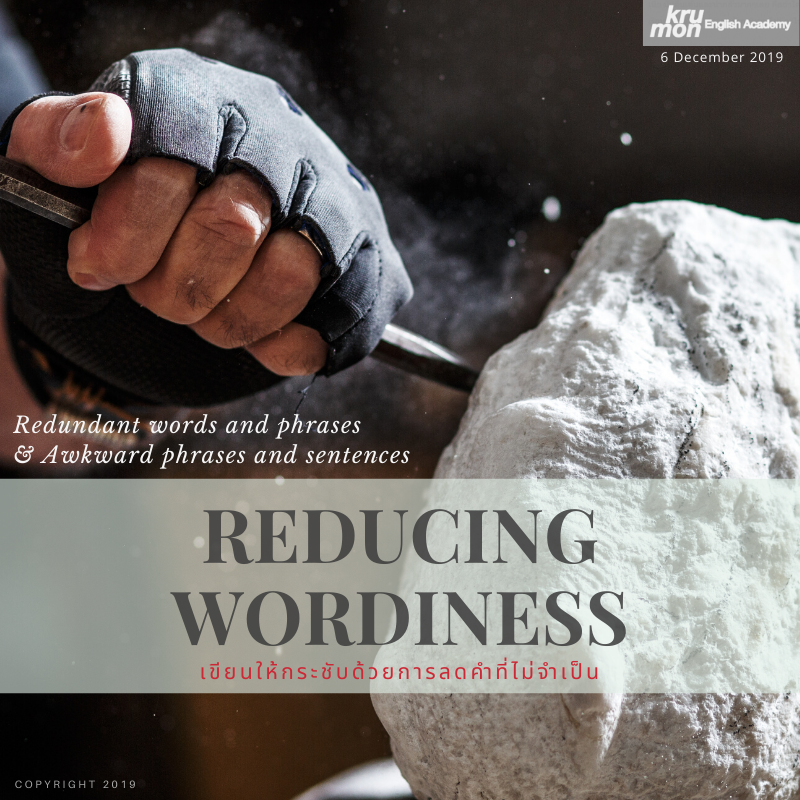Reducing wordiness: เขียนให้กระชับ(concise)ด้วยการลดคำที่ไม่จำเป็น
Author: Dr Natpat Chanjavanakul
Written: 26 November 2019
Published: 6 December 2019
*****
เราเรียกประโยคที่ใช้คำฟุ่มเฟือยว่า wordy
ซึ่งการตัดคำที่ไม่จำเป็นทิ้งไปนั่นถือเป็นวิธีการแก้ writing ที่ง่ายๆวิธีหนึ่งเลย
การ reduce wordiness นั้นมีสองกลุ่มใหญ่ๆ
1. Redundant words and phrases การใช้คำและวลีที่ความหมายซ้ำซ้อน
2. Awkward phrases and sentences คือการใช้วลีและประโยคที่ยาวเกินไปไม่จำเป็น ทำให้อ่านแล้วไม่ลื่นไหล
*****
1. Redundant words and phrases
Redundant แปลว่า ความหมายซ้ำซ้อน
เรื่องนี้ก็แก้ง่ายๆด้วยการอ่านทวน แล้วดูว่าคำไหนความหมายซ้ำบ้าง
ลองดูตัวอย่างประโยคนี้นะคะ
“Both unemployment levels as well as interest rates can affect stock prices.”
ประโยคนี้ซ้ำคือ ‘both’ กับ ‘as well as’ ซึ่งมีความหมายเหมือนกัน
ให้ตัดออกอันนึงได้เลยจะแก้ได้เป็น
“Both unemployment levels and interest rates can affect stock prices.”
หรือ
“Unemployment levels as well as interest rates can affect stock prices.”
อีกตัวอย่างนะคะ
“Every single individual in our class bought tickets to the concert.”
แก้เป็น
“Everyone in our class bought tickets to the concert.”
ตัวอย่างถัดมา
“The reason science is being blamed for threats to the natural environment
is because scientists fail to see that technology is only as useful,
or as harmful, as those who decide how to use it.”
คำว่า ‘reason’ มีความหมายเหมือนกับ ‘because’
คือเมื่อใดที่เราใช้คำว่า ‘because’ มันก็จะหมายถึง ‘reason’ อยู่แล้ว (เหตุ กับ ผล)
เมื่อเป็นเช่นนี้เราก็แก้ได้เป็น
“The reason science is being blamed for threats to the natural environment
is that scientists fail to see that technology is only as useful,
or as harmful, as those who decide how to use it.”
หรือ
“Science is being blamed for threats to the natural environment because
scientists fail to see that technology is only as useful, or as harmful,
as those who decide how to use it.”
*****
2. Awkward phrases and sentences
ลองมาดูตัวอย่างนะคะ
“To indicate the fact that they are in opposition to a bill, legislators sometimes engage in filibusters.”
ประโยคข้างต้นนี้จะเห็นได้ว่ายาวมาก เราสามารถเปลี่ยนได้เป็น
“To show their opposition to a bill, legislators sometimes engage in filibusters.”
ซึ่งก็ยังได้ความหมายเหมือนเดิม และกระชับขึ้น
อีกตัวอย่างนึงค่ะ
“In Norse poetry, the stories rarely stand as substitutes or symbols for anything other than the stories themselves.”
จะเห็นว่าคำว่า ‘other than the stories themselves’ ความหมายก็คือ ‘อย่างอื่น’
ดังนั้นเราใช้คำว่า ‘else’ แทนเลยก็ได้
“In Norse poetry, the stories rarely stand as substitutes or symbols for anything else.”
*****
สรุปวิธีการเขียนให้ดีขึ้น
1. Reduce a phrase or a clause into one word
เปลี่ยน phrase หรือ clause ให้เป็นคำเดียว
เช่น “The employee with ambition”
เป็น “The ambitious employee”
ตัวอย่าง “The price that was confirmed will be honored by the merchant.”
เป็น “The confirmed price will be honored by the merchant.”
2. Rework clauses with relative pronouns (that, who, which, etc.)
เปลี่ยน relative clause ที่มี pronoun (เช่น that, who, which)
ตัวอย่าง “The system that is most efficient and accurate…”
แก้เป็น “The most efficient and accurate system…”
3. Restructure sentences with it is, there is, there are
ปรับโครงสร้างประโยคที่ขึ้นต้นด้วย it is, there is, there are
ตัวอย่าง “There is a gene that causes hemophilia, which if paired with a healthy gene results in the individual’s not developing the disease’s symptoms.”
เปลี่ยนใหม่เป็น “If paired with a healthy gene, the gene that causes hemophilia will not result in the development of the disease’s symptoms.”
*****
ลองฝึกฝนการทำให้งานเขียนกระชับขึ้น โดยลองฝึกจากเปลี่ยนประโยคต่อไปนี้
คำเฉลยอยู่ข้างล่างค่ะ
1. She contacted a reporter from Australia.
2. The majority of the time that type of course takes place after 10 AM in the morning.
3. Have you ever read sentences that seem to ramble on and keep going forever?
4. Redundant sentences are boring and repetitive.
ไม่ยากเลยใช่ไหมคะ ตอนแรกๆเราอาจจะยังไม่ชิน
แต่ฝึกไปไม่นาน เราก็จะสามารถแก้งานเขียนตัวเองได้ค่ะ
*****
อ้างอิง:
Carlock, J., Eberhardt, M., Horst, J. & Menasche, L. (2016). The ESL writer’s handbook. Ann Arbor, MI: The University of Michigan Press.
Stewart, M. A. (2002). Writing skills for the GRE/GMAT tests. Lawrenceville, NJ: Thomson Peterson’s.
Warrier, J. E. (2008). Warriner’s handbook fifth course: Teacher’s edition. Austin, TX: Holt, Rinehart and Winston.
*****
เฉลยและคำอธิบายแบบฝึกหัด
1. “She contacted a reporter from Australia.”
‘From Australia’ เราสามารถเปลี่ยนให้เป็นคำเดียวได้เลย คือ ‘Australian’
“She contacted an Australian report.”
2. “The majority of the time that type of course takes place after 10 AM in the morning.”
‘The majority of the time’ ก็คือ ‘usually’
ส่วน 10 AM ก็บอกอยู่แล้วว่าเป็น ‘morning’
“That type of course usually takes place after 10 AM.”
3. “Have you ever read sentences that seem to ramble on and keep going forever?”
‘Ramble’ แปลว่า พูดไปเรื่อยเปื่อยไม่หยุด ซึ่งมีความหมายเดียวกับ ‘keep going forever’
‘Seem to’ ก็ตัดทิ้งได้โดยไม่ทำให้ความหมายเปลี่ยน
“Have you ever read sentences that ramble?”
4. “Redundant sentences are boring and repetitive.”
คำว่า ‘redundant’ แปลว่า ‘repetitive’ อยู่แล้ว ก็ตัดออกได้เลย
ได้เป็น “Redundant sentences are boring.”




